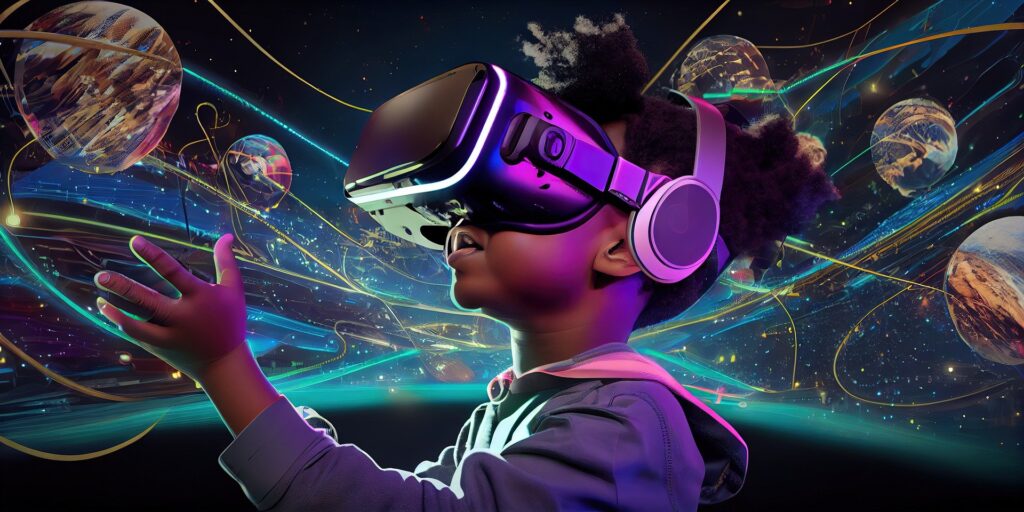Welcome to the future, where virtual reality isn’t just a buzzword—it’s becoming an integral part of our lives. The Metaverse is evolving rapidly, morphing from a mere concept into a dynamic, immersive digital landscape. With each passing day, virtual reality (VR) trends are reshaping how we interact with technology and each other. The possibilities are limitless, whether it’s exploring virtual spaces for gaming or engaging in social VR experiences.
As we dive deeper into this captivating realm, we’ll explore the latest innovations driving the Metaverse forward—from cutting-edge immersive technology to addressing ethical dilemmas that arise within these digital universes. Buckle up as we navigate through fascinating developments shaping our interaction with augmented reality (AR), extended reality (XR), and beyond!
The Evolution of the Metaverse: From Concept to Reality
The Metaverse began as a visionary idea, often portrayed in sci-fi literature and films. This digital realm was once confined to the imagination, but technological advancements have propelled it into our reality.
Initially centered around VR gaming, the concept has expanded dramatically. Today, immersive technology allows users to create their own virtual spaces and experiences. Social interactions within these environments are becoming increasingly sophisticated.
Blockchain technology is also playing a pivotal role. Decentralized systems allow for ownership of digital assets, giving users real stakes in this evolving landscape. Virtual currencies facilitate transactions seamlessly across platforms.
As companies invest heavily in Metaverse innovations, we’re witnessing a fusion of AR and XR technologies that further enhance immersion. Education, workspaces, and entertainment are merging with the digital world more than ever before. The journey from concept to reality is just beginning—and it’s full of potential.
Immersive Experiences: The New Standard in VR
Immersive experiences are revolutionizing the landscape of virtual reality. Gone are the days of simple interactions and flat graphics. Today’s VR transports users into vibrant, 3D worlds that feel incredibly lifelike.
The rise of immersive technology has set a new standard for engagement. Users can explore vast virtual spaces, interact with realistic environments, and connect with others in ways previously thought impossible.
From social VR platforms to advanced gaming scenarios, immersion is key. Players don headsets and lose themselves in meticulously crafted universes where every detail matters. The emotional impact is profound as they experience narratives like never before.
AR also plays a pivotal role, in enhancing real-world elements within these digital realms. This blend of augmented reality and traditional VR expands creative possibilities across various industries.
As developers continue to push boundaries, expectations will soar higher than ever before. Immersive experiences aren’t just an addition; they’re becoming essential to our digital lives.
Ethics and Privacy: Navigating the Challenges of a Digital Universe
As we continue to explore the vast possibilities of the Metaverse, ethics and privacy emerge as pressing concerns. The digital universe presents unique challenges that require careful navigation. With immersive technology like Virtual Reality (VR) and Augmented Reality (AR), users are more connected than ever before—yet this connectivity raises questions about data security.
The collection of personal information in virtual spaces can be extensive. Users often share sensitive details without realizing their implications. To foster a safe environment, developers must prioritize transparent practices regarding data usage. This is especially essential in social VR settings where interactions can feel deeply personal but may lack adequate safeguards.
Moreover, creating an ethical framework for behavior within these environments is critical. As VR gaming and experiences become increasingly popular, fostering respectful communication becomes paramount to ensure positive interactions among users from diverse backgrounds.
Addressing these ethical dilemmas will shape how individuals engage with emerging technologies moving forward. The balance between innovation in the Metaverse and protecting user rights will dictate its evolution into a sustainable digital realm that people trust and embrace wholeheartedly.
Navigating these complexities requires collaboration among tech companies, policymakers, and users alike. By prioritizing both innovation and ethics, we pave the way for a vibrant future where immersive experiences enhance our lives while safeguarding our values.
Conclusion
As technology continues to evolve, Metaverse 2.0 is set to revolutionize the way we interact with the virtual world. From augmented reality and haptic suits to social VR experiences, these emerging trends in virtual reality have the potential to change our daily lives and create new opportunities for entertainment, education, and communication. As more companies invest in this technology, it’s exciting to think about what possibilities lie ahead for us in a fully immersive digital world. The future of virtual reality is bright and we can’t wait to see where it takes us next!

